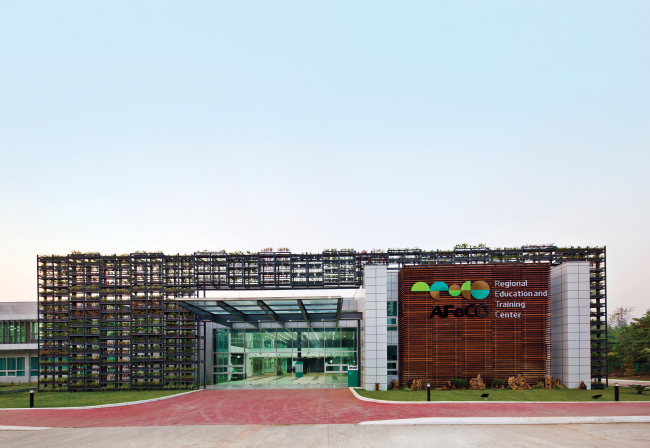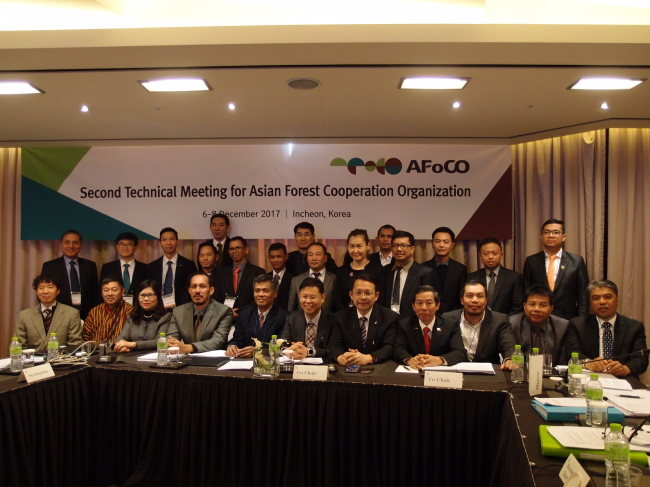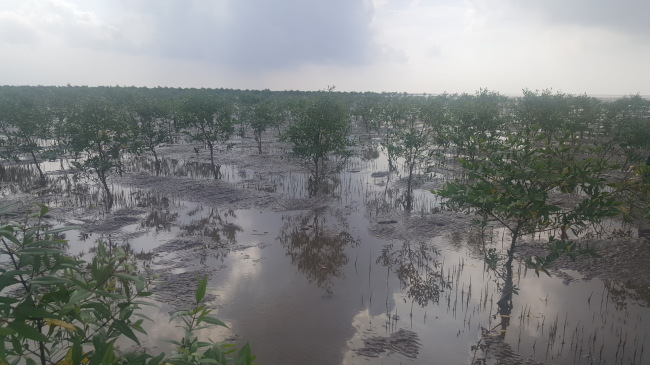The long-awaited Asian Forest Cooperation Organization will be officially launched on Friday as an intergovernmental regional organization with the aim of strengthening regional forest cooperation to address the impact of climate change, according to ASEAN-Korea Forest Cooperation Secretariat on Monday.
The AFoCO will be established to strengthen regional forest cooperation in Asia which is vulnerable to forest degradation and climate change and to contribute to achieving the sustainable development goals. It will also address the impact of climate change through translating proven technologies and policies into concrete actions.
 |
Bird’s eye view of the AFoCO Regional Education and Training Center in Hmawbi, Myanmar (Korea Forest Service) |
The 14 member nations are Korea, Bhutan, Brunei, Cambodia, Indonesia, Kazakhstan, Laos, Mongolia, Myanmar, Philippines, Singapore, Thailand, Timor-Leste, and Vietnam. Among them, 10 countries have currently signed the agreement and five parties have duly deposited the instrument of ratification. Other prospective members are undertaking necessary domestic clearance and ratification process.
Background
The establishment of Asian Forest Cooperation Organization was initially proposed by Korea at the ASEAN-Korea Commemorative Summit in 2009.
Following the proposal, the forest cooperation mechanism of ASEAN-Korea forest cooperation was formed in 2012 as the initial phase. During this phase, various regional forestry activities in the Southeast Asian region were undertaken. It tapped on the issues of reforestation and rehabilitation as well as enhancing local livelihood through participatory approach modeling from Korea’s successful forest rehabilitation.
“AFoCO recognizes the urgency in participatory capacity development of the local people in terms of sustainable forest management and addressing climate change,” said Park Eun-sik. Park, the acting executive director of the interim secretariat for the AFoCO.
“The AFoCO will continue building on its unique strengths and values of being field-oriented and practical to further grow into a key player in the forest sector in Asia,” Park added.
 |
Second technical Meeting for the Asian Forest Cooperation Organization held in December 2017 in Incheon, Korea to review necessary documents and preparatory works for the anticipated entry-into-force (Korea Forest Service) |
The AFoCO has an institutional arrangement with two organs, namely the “Assembly,” and the “Secretariat.” The Assembly is the decision-making body comprised of the Representatives of all Parties to the Agreement. The Secretariat, headed by the executive director and located in Korea, is responsible for the implementation, coordination, monitoring and reporting of activities under AFoCO.
The AFoCO projects and programs are developed and implemented based on the needs and policy direction of the proponent countries. The areas of project intervention include forest rehabilitation, prevention of forest degradation, biodiversity conservation, livelihood improvement through non-timber forest products and high value species and capacity development.
Particularly under the restoration component of the landmark program, forest rehabilitation and related activities are undertaken, over a 10-year period until 2023, in 960 hectares of mangrove forest in Vietnam, 3,800 hectares of degraded forest in Cambodia and Laos. Furthermore, all ASEAN member states involved benefitted from the implementation of seven regional projects.
Landmark program & regional projects
Under Asian Forest Cooperation Organization, a total of $23.87 million is committed until 2023 for the ongoing projects under the AFoCO, the secretariat said.
Among them, $16.57 million will be set aside for landmark programs that include the establishment of a regional education and training center in Myanmar, development of education & training programs, establishment of a forest genetics research center for restoration of major timber species in Cambodia, rehabilitation and development of the mangrove forest ecosystem in Thai Binh province, Vietnam, village-based forest rehabilitation in Laos and other advocating activities.
 |
Rehabilitation and development of mangrove forest ecosystem in Thai Binh Province, Vietnam (Korea Forest Service) |
As part of the Landmark Program, the construction of the AFoCO Regional Education and Training Center was also completed in December 2017. The establishment of RETC aims to strengthen the capacity building of the member countries in the forestry sector by providing modern facilities and equipment necessary for forestry education and training. It will become the research and learning hub for fostering capable qualified experts in Asia in the forest sector.
The remaining $7.3 million will be used for regional projects that include reclamation, rehabilitation and restoration of degraded forest ecosystems in Mekong basin countries, capacity building on improving forest resources assessment and enhancing the involvement of the local communities to address the impact of climate change that is participated by Brunei, Cambodia, Indonesia, Laos, Myanmar, Philippines, Thailand and Vietnam. It also includes promotion of forest rehabilitation in Cambodia and Vietnam through demonstration models and improvement of seed supply system participated by Cambodia and Vietnam.
The project in Mekong basin countries participated by Cambodia, Laos, Myanmar, Thailand and Vietnam is to investigate the present status of biodiversity utilization and forest management and to strengthen trans-boundary cooperation among the MBCs on conservation of landscape biodiversity and ecotourism.
The AFoCO also made efforts in capacity building of members by supporting scholarship programs members. Three scholarship recipients are selected each year targeting to support 30 graduate students until 2023. Also short-term training courses are continuously organized in various subjects, including sustainable forest management policy, forest fire management, governance and community based forest management, forest carbon and REDD+ mechanism.
REDD+ refers to reducing emissions from deforestation and forest degradation in developing countries, and the role of conservation, sustainable management of forests, and enhancement of forest carbon stocks in developing countries, which is a mechanism or process to address climate change in the forest sector, according to the secretariat.
By Shin Ji-hye and Lee Kwon-hyoung
(
shinjh@heraldcorp.com) (
kwnhl@heraldcorp.com)










